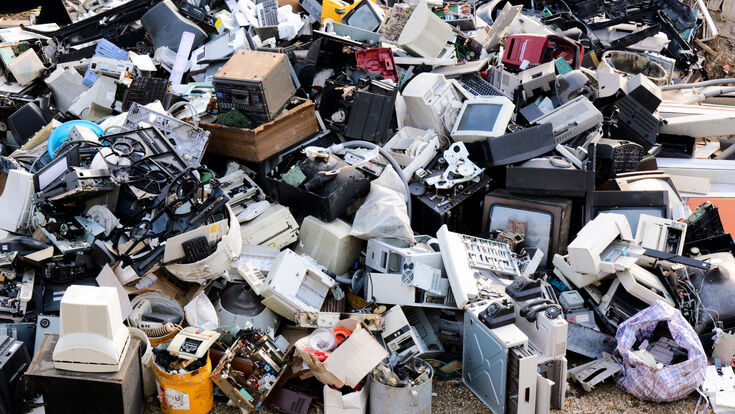Waste Recovery : UK loses an annual £13m in raw materials

A new research report reveals that the UK is on track to losing £13.64 million worth of critical raw materials due to a lack of advanced recovery technologies.
‘Contributing to a circular economy utilising Critical Raw Materials from Waste Electricals’ found that less than 1% of raw materials contained in electronic items such as laptops, tablets, mobile phones, monitors and lighting were being recovered prior to recycling. Said appliances, which often sport circuit boards and electric components, contain precious metals such as gold, silver or palladium worth £148 million per year.
Potential ways to recover the 300, 000 tonnes of said ‘lost electronics’ makes up the bulk of this research.
Further research points out that of a sum total of 155,000 tonnes of small electricals being discarded in the UK, 99,000 tonnes could be retrieved through the introduction of kerbside recycling services.
Technological processes to recover critical raw materials (CRM) are manifold. These pre-processing methods include shredding, mechanical coarse grinding, increasing the surface area for material recovery, dust extraction, electrohydraulic fragmentation, steam gasification, thermal desoldering and sequential leaching.
The recovered raw metals have their respective use in the production of green technologies such as wind turbines, photovoltaics, batteries, fuel cells, and hybrid and electrical vehicles. They are also valuable commodities to the pharmaceutical and car industry.
With the EU pledging itself to carbon neutrality by 2050 as part of the European Green Deal, the likes of solar and wind energy grows ever more important. As these technologies depend on raw materials, demand for them is set to increase over twenty times between 2010 and 2030.
The issues raised within the report commissioned by Material Focus and conducted by Giraffe Innovation have been addressed by other official parties in 2020 as well, ranging from the Environmental Audit Committee (EAC) to the Global E-Waste Monitor. The former similarly called on the UK government to invest more money into extraction technologies while the latter warned that e-waste is the fastest growing waste stream in the UK.
Considering the global race for raw materials, ranging from Germany and China fighting for lithium rights in Bolivia to the trade wars between South Korea and Japan, the UK appears uniquely positioned to take advantage of further economic benefits whilst working towards a circular economy.
